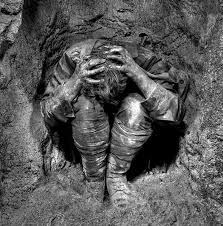 |
| WWI Soldier in Trench |
Lieutenant Leonard Allred suffered from PTSD or what was
first called “shell-shock” because it was believed the close proximity that
soldiers had to falling bombs literally vibrated their brain and caused them
mental illness. With little empirical research, little thought was given that
perhaps the killing, the dead bodies, the mangled friends, AND the explosions
probably caused the post-war stress and trauma. Allred (or the “spirit” of Allred)
said that there were 3 things recommended to cure shell-shock: sex, alcohol,
and insanity, all three he used to cope, leading to the abuse of his wife and
her eventual suicide.
Help wasn’t available for the Allred family. But I find it
interesting that the greater the adversity, such as war or other stressful
experiences, the greater our knowledge grows towards a concept, like
psychology. Does anyone remember that Mormon Message called “The Refiner’s Fire”? About the woman whose entire family died of cancer and what she learned
from it was the greater sorrow we have, the greater our capacity to feel joy
is? In some ways, I relate empiricism to this.
 |
| Art Therapy Project of Veteran with PTSD via WikiCommons |
And I think some may wonder, and this is something I have wondered as well: "But without war there wouldn't be PTSD." As modern studies show, not true.
Here is a cool article talking more about this.
Here is a cool article talking more about this.

I completely agree that the greater our sorrows, the more capacity for joy we have. I think it's interesting. It seems like you drew that out to humanity as a whole, which I don't completely agree with. I don't think we empathize enough with each other in order to collectively reap those benefits. I think this applies on a more individual basis,
ReplyDeleteIt is undeniable that even through terrible things such as war good things can come about. That is not to say we seek the bad so we can find more good, but we should always make something good when bad things happen. I appreciate your insights on this with regards to PTSD.
ReplyDeleteI think this is very insightful and accurate--Allred, at the Dead Soldiers' Debate, even said that a hatred for war in many nations came forth as a result of WWI. Even our individual hardships help us to grow, but we learn from tragedies as well.
ReplyDeleteI really like how you touched on the idea that PTSD can come out in many different ways from different types of trauma. It is fascinating both the reslience and fragility of the human mind.
ReplyDeleteAs awful as it is to use this saying here, necessity is the mother of invention. Through the World Wars, the Korean war, and conflicts in the Middle East, we've learned an incredible amount about PTSD and other mental and physical health problems.
ReplyDelete